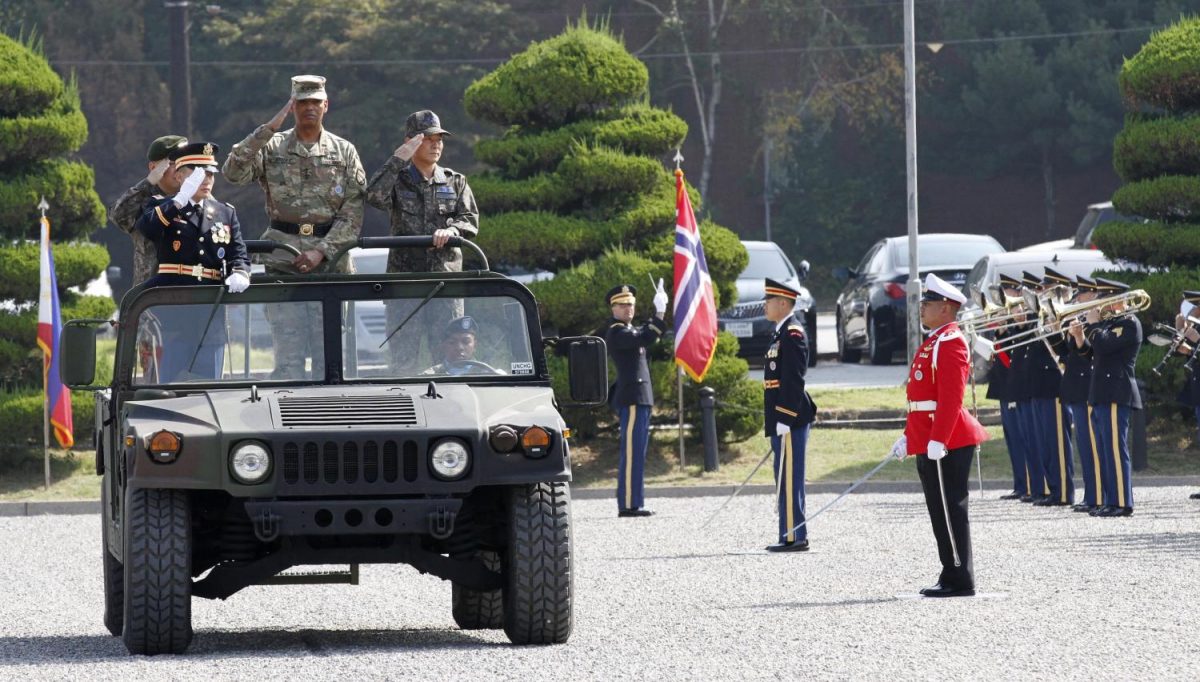A large military budget is crucial to defending the United States
Without a strong defense budget, the U.S. will be vulnerable to an attack.
Photo from United States Forces Korea, by Staff Sgt. Eliverto Larios, public domain.
Ceremony at the United States Army Garrison in Yongsan, South Korea
The United States spends $601 billion on funding the military, more than the next eight countries combined, creating controversy over whether large defense spending is worth it. However, a strong line of defense is a crucial priority for the United States. Because of the geopolitical risks posed by rogue nations like North Korea, spending large amounts of money on our military is justified—but could be made more efficient by eliminating wasteful spending.
With growing tensions around the world, the United States needs a strong military to defend itself. According to Business Insider, of the $601 billion America spent on defense in 2015, our base budget accounted for the vast majority of our spending at $496 billion. This funding “goes towards the operating cost of paying and caring for military personnel. A further $90.4 billion is set aside for the procurement of new weapons systems”. The majority of what our military budget yields are sustained foreign military bases and developed weapons systems.
U.S. military bases are necessary because they provide our military with proximity to other nations, giving them a means to learn about potential enemies and practice certain invasions. The clearest example of this is in the Foal Eagle drills exercised by the United States military with South Korea. These drills keep our men and women prepared to invade North Korea should geopolitical tensions get out of hand.
In order to develop an optimal military budget, Congress must consider issues holistically, without wasting money in a game of pork-barrel politics.
— Charles Kraemer
The other largest portion of the United States military budget is spent on developing and obtaining new weapon systems. With nations around the globe like North Korea and Iran becoming closer to getting nuclear weapons, the United States must consistently spend money in this area for the sake of maintaining a reliable line of defense. To this point, the United States has used this spending productively to develop and deploy reliable missile defense systems like THAAD in crucial tactical nations such as South Korea.
There is a simple way that our military spending could be made more efficient: eliminating pork-barrel spending. Pork-barrel spending is when politicians advocate for certain congressional decisions duplicitously in order to bring money to their represented district and gain popularity for themselves. According to David Francis, a writer for the Fiscal Times, when “Rep. Jim Jordan (R-OH) told the Associated Press that in the interest of national security, Congress needed to give the Pentagon $436 million to make improvements to the 70-ton Abrams tank.” Problematically, Congress approved of this spending while officials within the Pentagon itself felt that it was unnecessary given that tanks are becoming a much less significant means of defending the United States. In order to develop an optimal military budget, Congress must consider issues holistically, without wasting money in a game of pork-barrel politics.
Unfortunately, beyond this simple means of cutting spending, it is not clear what more can be done to maintain an effective military with the smallest military budget possible. However, the issue can be resolved when we consider that it is better to be safe than sorry. An insufficient military could entail losses of a tremendous magnitude in the event of a foreign attack, and therefore it is fitting that the United States prioritizes its spending on a strong military budget.

















































